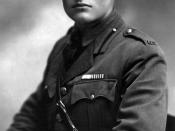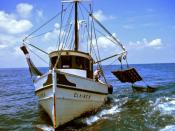"They beat me, Manolin...they truly beat." The first thing that one should consider when addressing this question is what does it mean to be beaten? Beaten in this context should not be interpreted literally as it actually means to be defeated. Bearing this in mind would I agree with Santiago's evaluation of the outcome of his adventure at sea? The answer to that question would most definitely be no. Santiago states this on (Page 103) when he says, "But a man is not made for defeat. A man can be destroyed but not defeated."
After reading this outstanding novel written by Ernest Hemingway, I am strongly of the view that even though Santiago suffered an immense loss at the end of the novel, he is never defeated, instead he emerges as a hero and a victor. Hemingway shows us that Santiago's struggle does not allow him to change his place in the world, instead it enables him to meet his most noble destiny.
The opening page of the novel establishes Santiago's character and it also sets the scene for the action to follow. From the very first paragraph Santiago is portrayed as someone struggling against defeat. We can see that he lives as an outcast and is constantly mocked and ridiculed by the other fishermen for his unsuccessful voyages to sea. The way in which they deal with him, illustrates that Santiago is an alienated and almost ostracized figure in his small village. Such an alienated position is distinctive of Hemingway's heroes, whose greatest achievements are fundamentally dependent upon their isolation.
However it is imperative that we keep in mind that in Hemingway's works, it is only once a man is removed from the deadening and insincere boundaries of modern society that he can confront the larger universal...


